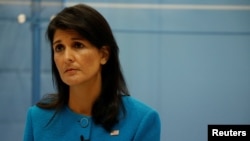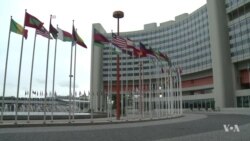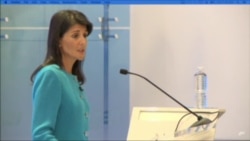A senior U.S. official said Tuesday that if President Donald Trump decides not to certify Iran’s compliance with the 2015 nuclear deal, it does not mean that the United States will withdraw from the multilateral agreement.
“This is critically important, and almost completely overlooked,” U.S. Ambassador to the United Nations Nikki Haley said.
WATCH: Trump Not So Sure About Iran
Trump is expected to report to Congress every 90 days whether Iran is still in compliance with terms of the nuclear deal reached with the United States and other major powers in 2015, the Joint Comprehensive Plan of Action, or JCPOA. The next presidential recertification is due next month.
“If the president chooses not to certify Iranian compliance, that does not mean the United States is withdrawing from the JCPOA,” Haley told an audience at the Washington-based American Enterprise Institute Tuesday.
“Withdrawal from the agreement is governed by the terms of the JCPOA,” Haley added.
The requirement for the U.S. president to certify every 90 days that Iran remains in compliance with the JCPOA - or to declare that it is noncompliant - is not part of the multinational agreement, but was instead a separate understanding reached between former President Barack Obama and the U.S. Congress.
WATCH: Amb. Nikki Haley on Iran nuclear deal
The 2015 deal aims to ensure that Iran does not acquire nuclear weapons. The five permanent members of the Security Council, plus Germany, negotiated the agreement with Tehran.
Iran’s verified compliance with the deal's provisions resulted in the U.N. Security Council lifting an array of international financial sanctions last year that had been in place for years, and the release of billions of dollars of Iranian funds that had been frozen by Western banks and governments.
Haley said the 2015 deal was “very flawed and very limited," but that she was not proposing its decertification. However, she added, if the president decides to reject the agreement now, he “has grounds to stand on.”
Trump has been a vocal skeptic of the deal. During his campaign for election last year, he said it was a “terrible” deal, and that he would either tear it up or renegotiate it if he was elected.
Trump has recertified Iran's compliance with the nuclear deal in messages to Congress since he took office in January. However, he has signaled that when the next recertification decision is due in October, he may take a different course. The president told Wall Street Journal last month, “I think they will be non-compliant.”
In a letter to the U.N. secretary-general dated August 28, Iran expressed its concern over new unilateral sanctions the U.S. has imposed. Tehran accused the Trump administration of pursuing a “malicious policy” to prevent it from benefiting from the terms of the JCPOA, and noted it has been certified compliant for the past two years by the U.N. nuclear watchdog agency, the IAEA.
Alex Vatanka, a senior fellow at the Washington-based Middle East Institute, said the big question confronting the Trump administration is, what will happen if it does choose to walk away from the nuclear deal?
“What will be left in terms of instruments of pressure at the hands of the United States [which] obviously wants to move the Iranians to behave differently in the region and at home?” Vatanka asked. “Is walking away unilaterally from that deal, is that the best way forward for Washington? I think Haley’s speech really didn’t offer us any alternative ways forward.”
Vatanka said the other signatories to the deal are not interested in seeing it changed or voided, nor are the Iranians.







